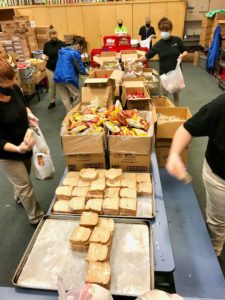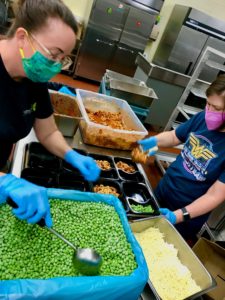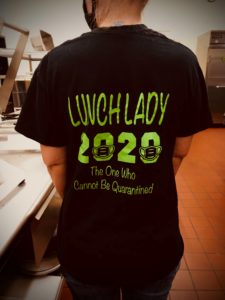Since March, Caroline County Public Schools Food and Nutrition Services (FNS) has been preparing, packing and delivering meals in the community due to COVID and increased hunger in an already food insecure county. The assembly line they have set up in the band room is highly organized and efficient and staff have adapted like chameleons as their circumstances rapidly change. 
Caroline County is rural and the third poorest county in the state. Transportation is difficult in normal times and COVID has only made it more challenging. Beth Brewster, Supervisor of Food Services, realized that the more typical grab-n-go meal pick up sites that other counties do just wouldn’t work here, so they deliver meals door to door. Families sign up and meals are delivered twice a week to cover three meals a day, seven days a week. They asked families to provide a cooler outside the front door, if they can, to help with personal and food safety.
Most students are learning virtually this year in Maryland but school meals are still an important source of nutrition and energy. In fact kids are relying on free meals more than ever this year, with many families having lost jobs or had their hours cut as a result of the pandemic. While many schools across the country have seen a massive dip in participation, Caroline continues to increase, largely due to their convenient delivery model.
 It hasn’t been easy to adapt the program as schools shift between in-person, virtual and hybrid learning models. “It’s the constant changing that is hardest,” Samantha Figueroa, FNS Operations Manager says.
It hasn’t been easy to adapt the program as schools shift between in-person, virtual and hybrid learning models. “It’s the constant changing that is hardest,” Samantha Figueroa, FNS Operations Manager says.
As more students return to in-person learning in Caroline County, FNS has to re-arrange staff and food. The cafeteria is set up with desks six feet apart in preparation for students coming back. Currently, students who are in school are working on computers in the library, gym or classrooms, socially distanced. The staff distributes meals to students at their desk in a carton, along with a bottle of water. The water adds cost to an already meager budget, but FNS realized that the students can’t go to the water fountain so they need it. When a majority of students are back, they will still serve individually at desks in the cafeteria because the line with social distancing would be too long to fit in the building. And then, of course, if students are sent back to virtual learning, they will have to change operations yet again.
“Fatigue is real, too. These staff workers have been doing this for months, and many of them are away from their home school,” Samantha explains. Beth and Sam realize it’s been challenging for staff and have provided encouragement and thank you gifts, such as a t-shirt that says, “Lunch Lady 2020 The One Who Cannot be Quarantined.” 
Beth and Sam have made the staffing schedule tight so that everyone can keep their job on an extremely tight budget. The FNS team does food preparation and packing in two different locations, and they are also now delivery drivers. This can add a challenge for staffing because if one person is out, it may affect two different locations. If they have symptoms that could be COVID, they must get tested and wait for results which takes at least five days.
There is high demand for meals due to need, but Samantha explains another benefit, “We hear that the kids miss school meals, too. It provides them with a little bit of normal.” Caroline County FNS also works hard to provide high quality, nutritious food. During “normal” school years, they pride themselves on providing daily options to their students, which they can’t do with the delivery model. This frustrates them, but they still provide a great variety in meals.
Despite these challenges, the team is unstoppable. When I thank the staff members for their tireless efforts and for keeping up with the increasing demand, they simply say, “It’s all about the kids.” This is the type of attitude and dedication that has helped Caroline County students and families deal with hunger since March. The Food and Nutrition Staff deserve hero status for their essential work.





